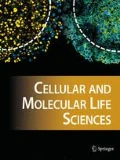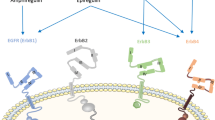Abstract.
Heregulin (HRG) is a soluble secreted growth factor, which, upon binding and activation of ErbB3 and ErbB4 transmembrane receptor tyrosine kinases, is involved in cell proliferation, invasion, survival and differentiation of normal and malignant tissues. The HRG gene family consists of four members: HRG-1, HRG-2, HRG-3 and HRG-4, of which a multitude of different isoforms are synthesized by alternative exon splicing, showing various tissue distribution and biological activities. Disruption of the physiological balance between HRG ligands and their ErbB receptors is implicated in the formation of a variety of human cancers. The general mechanisms involved in HRG-induced tumorigenesis is discussed.
Similar content being viewed by others
Author information
Authors and Affiliations
Corresponding author
Additional information
Received 8 March 2007; received after revision 6 May 2007; accepted 9 May 2007
Rights and permissions
About this article
Cite this article
Breuleux, M. Role of heregulin in human cancer. Cell. Mol. Life Sci. 64, 2358–2377 (2007). https://doi.org/10.1007/s00018-007-7120-0
Published:
Issue Date:
DOI: https://doi.org/10.1007/s00018-007-7120-0




